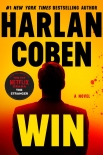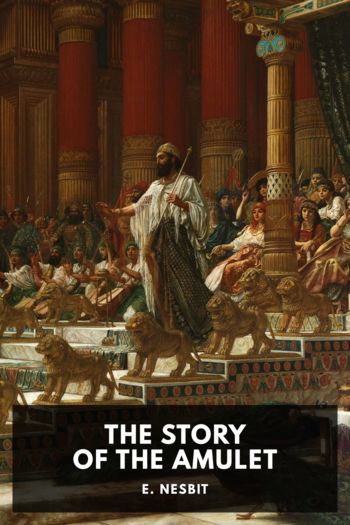WIN, Coben, Harlan [ebook and pdf reader .txt] 📗

Book online «WIN, Coben, Harlan [ebook and pdf reader .txt] 📗». Author Coben, Harlan
I change into golf khakis and a polo shirt with the famed logo of Merion Golf Club—a wicker basket atop a pin rather than a flag. I will let you in on a secret that most people don’t know. Several of your most exclusive courses sell shirts and paraphernalia to visitors and guests—this is big business—but if the name of the club is written under the logo, it means that you are a tourist. If the name is not there, as it is not on mine, if there is only the logo and no words, that indicates that the wearer is a bona fide club member.
Class distinctions. They exist everywhere.
There is a pair of golf shoes in the closet. I slip them on and pad out to where my father is practicing pitch shots from thirty yards out. He turns and smiles as I approach. We don’t bother with hello. This is golf. Words become superfluous. I grab a 60-degree Vokey wedge.
My father goes first in our endless rounds of Closest to the Cup. In his youth, Dad was a champion golfer. He won the Patterson Cup, Philadelphia’s top amateur prize, when he was only twenty-one. A lot of his game has deteriorated with age, but he still has that feathery touch around the greens. He is using his old Callaway 52-degree pitching wedge. When he pitches, he keeps the ball flight low. The ball lands at the start of the green, follows the break, and curls up within two feet of the cup.
Merion Golf Club is down the road and around the corner. My father and I would walk there with our carry bags on our shoulder. That was where we played. My best childhood memories all revolve around being on the golf course, mostly with my father. We rarely spoke as we strolled. We didn’t have to. Somehow my father and golf were able to convey life lessons to me—patience, failure, humility, dedication, sportsmanship, practice, small improvements, missteps, mental error, fate, doing everything right and still not getting the desired result—without words.
You may love the game, but as in life, no one—no one—gets out unscathed.
It is my turn. I open the clubface all the way so as to hit with a high-lofted trajectory with maximum spin—what is commonly called a flop shot. The ball sails into the sky and lands softly with minimal roll. My shot ends up six inches closer to the cup. My father smiles.
“Nice.”
“Thank you.”
“But the low roller is the higher percentage shot,” he reminds me. “The flop is great on a practice facility. But on the course, when the pressure mounts, that shot is risky.”
He doesn’t ask me how I am, but then again, I’m not sure that he knows about my recent mishap in the van. Would Nigel have told him? I don’t think so.
“Try another?” he asks.
“Sure.” Then I say: “Per our last conversation, I asked Cousin Patricia why you and Uncle Aldrich became estranged.”
The smile slides off his face. Using his pitching wedge, he scoops another ball forward and lines up for his chip. “What did she tell you?”
“About his Peeping Tom incident during her Sweet Sixteen.”
Dad nods a little too slowly. “Tell me exactly what Cousin Patricia told you.”
I do. We continue to chip. The practice green has six holes, so that he never hits the same shot twice. Dad doesn’t believe in that. “You never hit the same shot twice in a row on the course,” he would tell me. “Why would you do it on the range?”
“So,” my father says when I finish, “Cousin Patricia told you that Ashley Wright’s father came to see me.”
“Yes.”
“Carson Wright has been my friend since we were twelve,” Dad says. “We played in the juniors together.”
“I know.”
“He’s an honorable man.”
I don’t know whether he is or he isn’t, but I say, “Okay,” to keep the conversation flowing.
“It wasn’t easy for Carson.”
“What wasn’t?”
“Coming here. To this house. Telling me the full story.”
“Which was?”
“Your uncle did far more than merely peep.” Dad held the follow-through on his next chip, checked his wrist position, and watched the ball roll. “I don’t know what the term for it is now. Pedophilia. Rape. Inappropriate relationship. When it began, Aldrich was forty. Ashley was fifteen. And if you want to defend it—”
“I don’t.”
“Well, even if you did. People did in those days. ‘You’re sixteen, you’re beautiful, you’re mine.’ ‘Young girl, get out of my mind.’ Songs like that.”
“So Carson Wright came to you?” I prompt, trying to get him back on track.
“Yes.”
“And said?”
“That a few months before the party, when your uncle wouldn’t return her calls, his daughter Ashley swallowed pills. She had to have her stomach pumped.”
“Yet she came to the Sweet Sixteen?”
“Yes.”
“Why?”
“You don’t know?”
I wait.
“Normalcy. That was the way it was, Win.”
“Sweep it under the rug?”
My father scowls. “I always disdained that analogy. More like you get over it. You bury it so deep no one will ever unearth it.”
“Except that didn’t work.”
“Not that night, no.”
“So what did you do after Carson’s visit?”
“I confronted Aldrich. The situation turned ugly.”
“Did he deny it?”
“He always denied it.”
“Always?”
“This wasn’t his first time,” my father says.
I wait. My father turns to me. He waits. This is a game we’ve both played before.
“How many others were there?” I ask.
“I couldn’t give you a count. When a problem arose, we moved him around. That was why he didn’t stay at Haverford like the rest of us.”
“I thought he chose NYU to be different.”
“No, your uncle started his collegiate life at Haverford. But there





Comments (0)